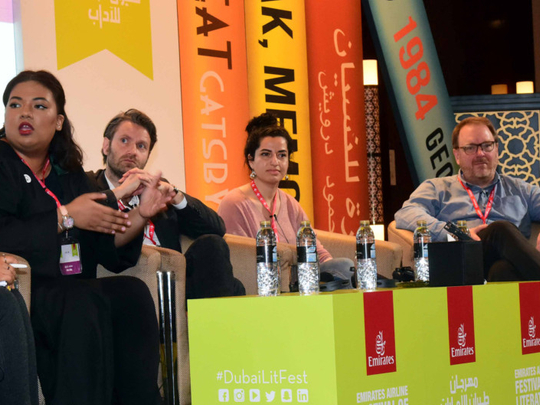
Dubai: A city may be made up of buildings but its people are its soul, panellists of varied backgrounds agreed during an Emirates Airline Festival of Literature session in Dubai on Saturday.
Speakers from the world of art, architecture, design and the science of well-being said interpersonal interactions as well as engagements with spaces in the city constitute the essence of cities more than the infrastructure.
They were speaking during a noontime session titled ‘The Soul of a City’, whose moderator Rachel McArthur invited panellists to explore what the subject means to them.
Afra Atiq, a Dubai-based Emirati spoken-word poet, said it was the stories of people, as well as the “underrated” art of storytelling, that means “so much more” than buildings, skylines and “static things”. She added cities should not be thought of as “structures” alone, but rather as incubators of art, culture and human ambition.
Speaking about Dubai, Atiq said its “essence” is that “you can think big, you can achieve anything” here.
Yara Bamieh, a graphic designer and illustrator based in Ramallah who has worked on conservation, reconstruction and cultural projects in Palestine, agreed a city’s soul “isn’t about the buildings”, although architecture is important. Her point was that it is how people feel a sense of “ownership and relationship” with public spaces, streets and buildings that was more significant. She outlined examples of “the stories of people” she uncovered during her conservation work.
Eric Broug, a specialist of Islamic geometric design from the Netherlands, said the soul of a city “is not one thing or the other”, adding it “means different things to different people”, varying even within an individual at different points in his or her life. He said “it works if you have a personal connection” with any aspect of a city — the people encountered everyday on the way to work, or even a café.
Danish national Meik Wiking, CEO of the Happiness Research Institute and the author of ‘The Little Book of Lykke’, said cities need to be people-centric, focused on their inhabitants’ well-being in all aspects. He said people should be made to feel “like kings and queens” in their city, not as “second rate citizens”. For example, Wiking added, cars, and not pedestrians, are priorities in some cities, making people feel less important.











